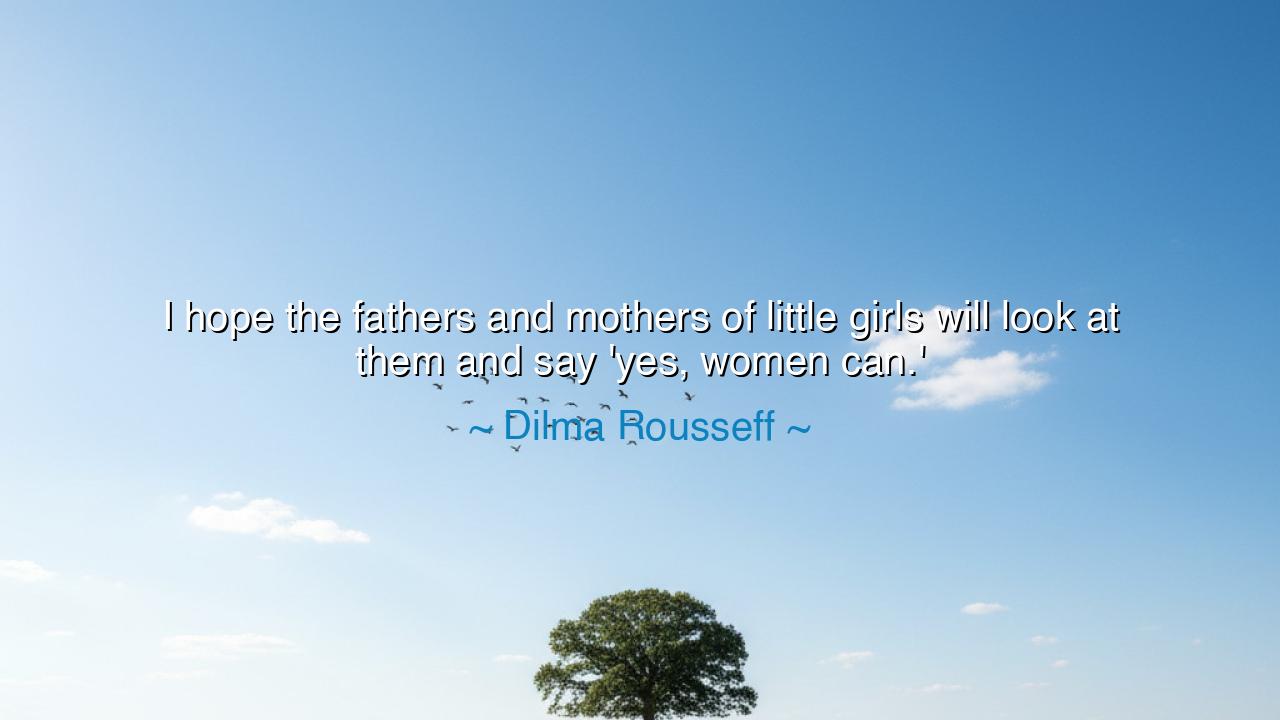
I hope the fathers and mothers of little girls will look at them
I hope the fathers and mothers of little girls will look at them and say 'yes, women can.'






“I hope the fathers and mothers of little girls will look at them and say yes, women can.” These words, spoken by Dilma Rousseff, the first woman to serve as President of Brazil, echo like a clarion call through the corridors of time. They rise not merely as a declaration of pride, but as a testament to the breaking of chains—chains that once bound women to silence, to the shadows, to the roles others prescribed for them. In these words burns a flame ancient as the hearths of our ancestors: the flame of possibility, the belief that destiny is not written by gender but by courage.
Long ago, in lands both humble and great, daughters were told to bow before the world’s order, to be seen but not heard, to love but not lead. Yet through the centuries, some rose to defy that command. Consider Joan of Arc, who, in the age of kings and steel, heard not the voice of doubt but the voice of purpose. She put on armor when the world said she could not. She led men into battle when the world said she must not. Her courage was not just in wielding the sword, but in daring to believe that divine strength dwells equally within woman and man. Dilma Rousseff’s words spring from that same sacred lineage of defiance—the lineage of those who believe that the impossible bends before the will of the determined.
The meaning of Rousseff’s quote lies not in politics alone, but in the awakening of vision. She calls upon fathers and mothers, the keepers of the next generation’s dreams, to see in their daughters not fragility, but fire. It is an appeal to reshape the mirror through which society views womanhood. For every time a child is told “you can,” a chain falls away from the collective heart of humanity. Every time a little girl is shown a woman leading, creating, commanding, or inventing, she learns that her spirit is not a guest in the world, but its rightful heir.
And yet, the path to that awakening is not easily walked. Rousseff herself endured hardship, imprisonment, and humiliation under Brazil’s military dictatorship before she rose to power. Her journey mirrors the struggles of countless women who have borne not only the weight of their ambitions but also the burden of prejudice. They have been tested in ways unseen—made to prove their worth twice over, to fight for a voice, to labor for recognition. But from such trials emerge not bitterness, but strength forged in the furnace of resistance.
There is an ancient saying: “From the ashes of silence, truth takes flight.” Rousseff’s words remind us that every act of courage by a woman becomes a beacon for the generations that follow. Think of Malala Yousafzai, a girl who defied terror to demand the right to learn. Her story, like Rousseff’s, is a hymn to the same truth—that to say “women can” is to declare that humanity itself can rise higher, reach further, and live more justly. When a father looks at his daughter and sees not limitation but boundless light, the world shifts upon its axis.
The lesson of this quote is thus both simple and profound: we must believe before the world believes, for belief is the seed from which all triumphs grow. To say “women can” is not to diminish men, but to restore balance—to heal the wounded halves of creation that have too long stood apart. The destiny of humankind is written not in dominance, but in harmony; not in division, but in shared strength.
So let every reader take this teaching into their heart: when you see a young girl dream, do not shrink her vision—magnify it. When she speaks, listen as though the future itself were whispering. Teach her not that she must wait for permission, but that the power to create her path already lies within her. Let homes, schools, and nations become sanctuaries of encouragement, where “yes, women can” is not a slogan, but a living truth.
And when you next gaze upon the dawn, remember Dilma Rousseff’s words as a vow and a promise: that we shall be the generation that teaches daughters to rise unafraid, and sons to stand beside them as equals. For in that harmony lies the hope of the world—a world reborn in courage, compassion, and the undying faith that yes, indeed, women can.






AAdministratorAdministrator
Welcome, honored guests. Please leave a comment, we will respond soon